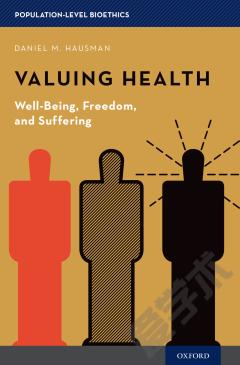Valuing Health —— Well-Being, Freedom, and Suffering
----- 评估健康: 幸福、自由与遭遇
Introduction Acknowledgments 1. Why Measure Health? 1.1 Clinical and research uses 1.2 Epidemiological or demographic uses 1.3 Allocational use 1.4 What a generic health measure should be 2. Health 2.1 Functional efficiency 2.2 Pathological vs. healthy part function 2.3 Should generic health measures quantify theoretical health? 2.4 Functional efficiency without statistical normality 2.5 Tentative Conclusions 3. Normative Conceptions of Health and its Measurement 3.1 Evaluative views of health 3.2 Criticism of evaluative theories 3.3 Concepts of health and generic health measurement 3.4 Conclusions 4. Can Health Be Measured? 4.1 Measuring overall functional efficiency 4.2 What measurement requires 4.3 Categorizing health states 4.4 Is the " relation complete? 4.5 Does the value of health reflect the quantity of health? 5. Health Measurement Systems 5.1 Quality and disability weights 5.2 Health-related quality of life (HRQoL) 5.3 Assigning disability weights in GBD 2010 5.4 GBD 2010: Interpreting the paired comparisons 5.5 Conclusions: Why are health economists measuring attitudes? 6. Well-Being and the Value of Health 6.1 Well-being and the value of life 6.2 Theories of well-being 6.3 Can the value of health states be measured? 6.4 Measuring average and standard values of health states 6.5 What good are average or standard health-state values? 7. Preferences 7.1 What do economists take preferences to be? 7.2 Preference and well-being: evaluative competence and the evidential view 7.3 Preferences and other attitudes 7.4 Preferences, attitudes, and feelings 7.5 Can health be measured by preferences? 8. Valuing Health by Eliciting Preferences 8.1 Critique of preference elicitation practices 8.2 Preference measurement and cognitive limits 8.3 Whose preferences? 8.4 Averaging 8.5 Why rely on informants to value health states? 8.6 Conclusions 9. Health and Happiness 9.1 Dolan and Kahneman's argument for subjective evaluation 9.2 Subjective evaluation 9.3 What matters, mood or subjective appraisal? 9.4 Subjective evaluation of health 9.5 Conclusions 10. Qualms about Valuing Health by Well-Being 10.1 Well-being and the value of health 10.2 Can well-being be measured? 10.3 Subjective experiences as a measure of well-being 10.4 Measuring well-being by preferences 11. What Makes Well-Being Measurable? 11.1 Fundamental evaluation and Hume's position 11.2 A more thoroughgoing subjectivist response and its problems 11.3 What makes states of affairs better for people? 12. Should Health Be Valued by its Contribution to Well-Being? 12.1 The pitfalls and advantages of valuing health by its impact on well-being 12.2 How else can health be valued? 12.3 Is a scalar measure needed? 12.4 Should health states be valued by their contribution to well-being? 13. The Public Value of Health 13.1 The " of health states 13.2 Liberalism and the value of health 13.3 The two dimensions of the public value of health 13.4 Public vs. private value and liberal state policy 13.5 Conclusion: the public value of health 14. Measuring the Public Value of Health States 14.1 Ordering distress 14.2 Ordering activity limitations 14.3 Classifying health states for public evaluation 14.4 Valuing limitation/distress pairs 14.5 Conclusions: public evaluation 15. Putting Health Measures to Work: Population Health and Cost-effectiveness 15.1 Cost-effectiveness analysis 15.2 Technical problems and conceptual problems in measuring effectiveness 15.3 Should effectiveness be measured by increases in well-being or health? 15.4 Further normative questions concerning what to measure 15.5 Moral objections to rationing by cost-effectiveness and the relevance of public values 15.6 Conclusions 16. How Health Policy Should Meet the Ethical Challenges 16.1 Can the fair chances objection be justified? 16.2 Severity: compassion and priority 16.3 Non-aggreggation: respect or compassion 16.4 Discrimination and fairness 16.5 Rationing fairly and humanely 16.6 Freedom, fairness, compassion, and markets 17. Restricted Consequentialism and Public Policy 17.1 Restricted consequentialism 17.2 Coping with the measurement demands of restricted consequentialism 17.3 Why not just ask? 17.4 Conclusions 17.5 A brief recap References
{{comment.content}}








 京公网安备 11010802027623号
京公网安备 11010802027623号